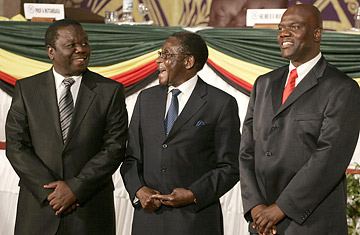
Zimbabwe's President Robert Mugabe, center, laughs with opposition leader Morgan Tsvangirai, left, and Arthur Mutambara after signing a power-sharing deal at Rainbow Towers hotel in Harare, Sept. 15, 2008
Cheers and smiles erupted at Harare's Rainbow Towers on Monday as President Robert Mugabe appeared to relax his grip on power in Zimbabwe for the first time since the nation's independence in 1980. In an unprecedented ritual of unity following months of political violence directed at opposition supporters, Mugabe shook hands with opposition Movement for Democratic Change (MDC) leader Morgan Tsvangirai and Arthur Mutambara, the leader of a rival faction within the opposition, as they signed a deal under which, although Mugabe remains President, the MDC will take the lead in the day-to-day running of the government, led by Tsvangirai, who will become Prime Minister. It was a compromise deal neither side wanted but neither side had the leverage to resist.
The new arrangement will give Mugabe control over the Cabinet, although his powers have been curtailed. Tsvangirai, with Mutambara and one other MDC appointee as his deputies, will head a parallel power structure called the Council of Ministers, which will oversee the Cabinet. The two factions of the MDC will control 16 of 31 new Cabinet posts in addition to its small parliamentary majority. After last-minute wrangling over the weekend, it was reportedly agreed that Tsvangirai would take control of the police and foreign affairs, while Mugabe would retain control of the army and intelligence services — which are widely believed to be controlling the country now, through a shadowy politburo known as the Joint Operations Command. Members of Mugabe's regime and security forces will also enjoy immunity from prosecution over acts of violence against opposition supporters.
Neither Mugabe nor Tsvangirai made any secret of their difficulties in accepting the accord. "We had two options: to put aside our differences, or to plunge the country into the abyss of a failed state," Tsvangirai said after the signing. "I have signed this agreement because my belief in Zimbabwe and its people runs deeper than the scars I bear from these struggles." Mugabe was less conciliatory in his own 30-min. speech, drawing jeers from the crowd as he took swipes at Tsvangirai and lashed out at the United States and Britain, whom Mugabe has blamed for undermining his regime and sowing the seeds of the country's crisis. "They spoke of regime change, and they are still speaking of it," he said. "They imposed sanctions. We had not attacked Britain; we had not done anything to Britain." He then went on to imply that democracy is not working in Africa, saying, "We must resist those who want to impose their will on us. This thing called democracy in Africa is a difficult proposition. Always the opposition want more than what they deserve."
The deal, brokered by South Africa's President Thabo Mbeki, looks set to end months of political turmoil that began when Mugabe finished behind Tsvangirai in the first-round presidential poll on March 29 and unleashed his security forces in a campaign of violence that prompted Tsvangirai to withdraw from a runoff poll in June. The key factor forcing Mugabe to relent on his resistance to sharing power was Zimbabwe's economic collapse, prospects for recovery from which are heavily dependent on international assistance — and therefore on resolving the political crisis. Having agreed to share power, Zimbabwe's political rivals have taken a crucial first step down what is certain to be a long and difficult path toward rebuilding Zimbabwe. "This is just the beginning," Mutambara acknowledged before a cheering crowd. "The hard work starts today."
Despite the relief and jubilation on display at the signing ceremony, analysts note the deal is fragile and fraught with uncertainty over the practicalities of sharing power between such bitter enemies. Many expect that Mugabe will continue to do his utmost to undermine the deal and sideline his opponents, while the military — believed to be the dominant voice in the President's inner circle, and which vehemently opposes MDC rule — is another potential stumbling block. "It's like an egg at the moment," Harare political analyst John Makumbe told TIME. "The stuff inside the deal is very good, but the shell is very fragile, so let's hope it doesn't get dropped."
Some warn of a parallel to the aftermath of Zimbabwe's independence struggle, when Mugabe drew his then chief political rival, Joshua Nkomo, into a unity government and then proceeded to neutralize his power and bludgeon his supporters. They fear that Tsvangirai may have been forced, by the limited options available to him, to make too many compromises and substantially alter the power equation. Opinions among analysts and diplomats on the agreement range from muted optimism to quiet skepticism, while potential donors such as the European Union will likely wait to assess the implementation of the agreement and its changes in economic policy before ponying up the billions of dollars in investment that have been pledged.
A reminder of the difficulties ahead was in evidence even at the celebratory signing of the accord. Outside the venue there were violent clashes between supporters of Mugabe's Zanu-PF and activists of the MDC. Police fired warning shots as members of the opposing camps threw stones at one another and smashed car windows. Still, ordinary Zimbabweans on both sides of the political divide expressed their optimism. "It is good that the leaders are now working together," Zanu-PF supporter Tichaona Maheu told TIME. "I hope they will address the economic hardships the country is facing. I believe the leaders will work together for the good of the people." But as the leaders themselves acknowledge, the work of rescuing the dysfunctional economy and healing a sick, hungry and traumatized populace has only just begun. (See photos of political tension in Zimbabwe here.)
— With reporting by Simba Rushwaya / Harare
